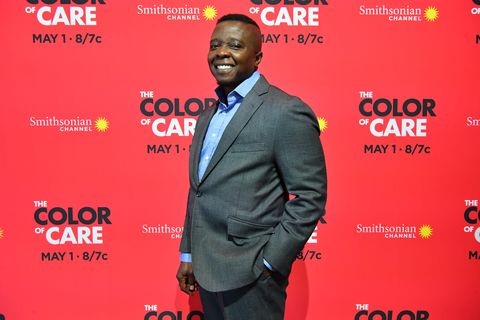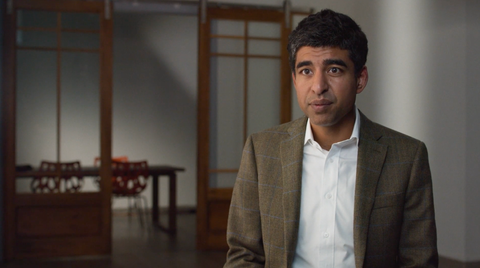It’s been two years since the pandemic and the murder of George Floyd made it impossible for many Americans to ignore the hold racism has on American institutions. The Covid-19 crisis unearthed deep inequities in the healthcare system—but widespread change has yet to come. To shine a light on these continuing issues, Oprah executive produced an eye-opening new documentary, The Color of Care.
The film, which premieres May 1 on the Smithsonian Channel, focuses on the stories of families who lost loved ones during the pandemic, including one that led Oprah to the project: “I read a story about Gary Fowler, a Black man who died in his home because no hospital would treat him despite his Covid-19 symptoms,” she says. “This film is my way of doing something, with the intention that the stories we share serve as both a warning and foster a deeper understanding of what changes need to take place to better serve us all.”
Oprah called on Oscar-nominated and Emmy-winning director Yance Ford to amplify these stories. Ford previously directed the true-crime documentary Strong Island, which tells the story of his brother William’s killing at the hands of a white man who was acquitted on the claim of self-defense. Ford tapped medical experts including Neel Shah, MD, chief medical officer at Maven Clinic and an assistant professor of obstetrics, gynecology, and reproductive biology at Harvard Medical School, to unravel how structural racism in the healthcare system can negatively impact health outcomes—and for some, be a death sentence.
Both Ford and Dr. Shah spoke to us about their motivations for participating in the documentary, what it was like on set, and what they hope people will take away from The Color of Care.
The film sheds light on how the healthcare system works—and how it doesn’t.
“When you see something that gives you the opportunity to expose the function of something as old as racial inequities in healthcare, it’s an opportunity to make a difference in our culture,” Ford says. He was excited to be part of a project that would uncover the systemic problems—but he also couldn’t say no to working on something with Ms. Winfrey herself. “Anyone who gets a call from Oprah Winfrey, who has been responsible for so much enlightening, meaningful, important content in our culture—that’s a day you’ll never forget."
Ford reached out to Dr. Shah just a few months into the pandemic. “At the time, I was a doctor on the front lines, but was also doing research into racial inequity in maternal health,” Dr. Shah says. While he was apprehensive about being on camera—and whether he was even the right expert having never firsthand experienced healthcare inequity—Ford convinced him.
“Dr. Shah is able to articulate a lot of things about medicine and the way the institution of medicine works in really accessible ways,” Ford says. This clear communication from many of the participants is what makes the film so impactful, according to Dr. Shah. “Part of its power is that it has an unflinching look at these families who were directly impacted, but it also has a number of people who occupy leadership positions in American medicine talking about what they were seeing in honest terms,” he says.
Progress means being willing to be uncomfortable.
For the families sharing their stories, empathy was the most important piece. “It’s always humbling when people are able to share their fond memories of a loved one they’ve lost because it brings that person back to life in a way that very few other things can,” Ford says.
“I want the next generation of doctors to be the end of health inequities.” —Yance Ford
On the other hand, getting to the bottom of injustice created distinctly difficult conversations, too. “The only way you get progress is by leaning into that kind of discomfort,” Dr. Shah says. “I’m a person of color, but I don’t have the complete sense of what it’s like to be one of the impacted families. Talking in frank terms about racism inside the institutions that I’m part of leading is uncomfortable, and I think that that’s what progress requires.” Still, Ford’s compassionate aura led to an open environment. “Somehow, despite all this injustice and these wrenching stories, he approached the entire thing with incredible empathy for everybody, which made me as comfortable as I could being frank and critical,” Dr. Shah says.
Real systemic change is possible.
Even amid such heavy subject matter, both Ford and Dr. Shah are optimistic. “I don’t think that people will leave the film demoralized,” says Dr. Shah. "I think the opposite. It lands on a rallying cry. The reason it works is because there’s such sharp moral clarity depicted.” Part of that clarity comes from acknowledging the collective instead of the individual. “When we think about institutions in our country, we tend to think about our individual interactions,” Ford explains. “But it’s not about finger-pointing or wanting to have villains or heroes. The doctors and other healthcare providers, they’re caught in the same system. If we can all together recognize and admit that the system exists and we’re functioning within it, we can all together try to figure out our way out of it.”
“The only way you get progress is by leaning into discomfort.” —Dr. Shah
Dr. Shah echoes a similar idea. “A bad system will beat a good person every time. When bad things happen, you think, Well, that was just not a good hospital. But this really shows a pattern that affects different people in communities across the country. The one [thing] they have in common is they’re people of color,” he says.
“I want the next generation of doctors to be the end of health inequities," says Ford. “There are all sorts of reasons for hope after watching this film. There are all sorts of reasons for action. As Oprah says, change is the only cure for this. It’s important to remember that.”
Watch The Color of Care on the Smithsonian Channel on May 1, 2022, at 8:00 PM EST/7:00 PM CST.
This content is imported from OpenWeb. You may be able to find the same content in another format, or you may be able to find more information, at their web site.
The Color of Care Documentary Interview - Yance Ford & Dr. Shah - Oprah Mag
Read More



No comments:
Post a Comment